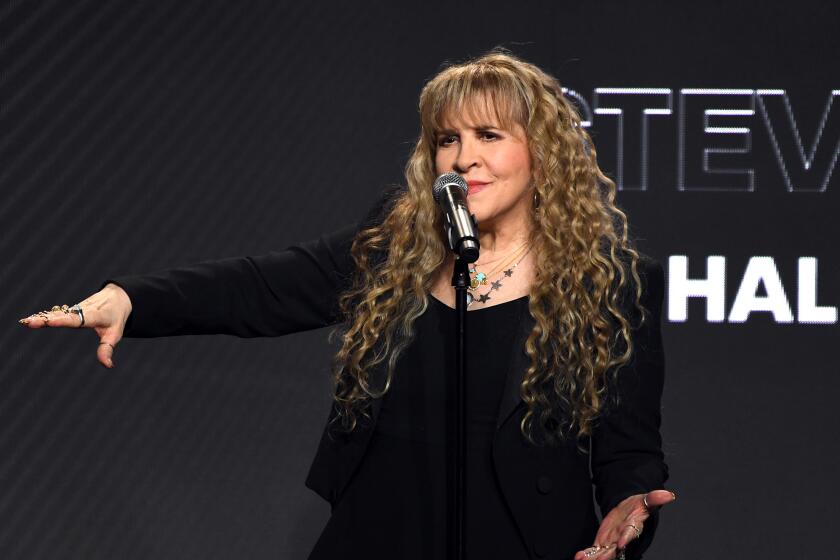Vernon Scott, 79; Columnist on Hollywood
- Share via
Vernon Scott, who covered Hollywood for more than five decades for United Press International, died Monday at Barlow Respiratory Hospital in Los Angeles after two cardiac arrests. He was 79.
The veteran entertainment reporter, who counted many top movie and television stars among his friends, had been hospitalized since Oct. 18 with pancreatitis. He was interviewing celebrities and writing about them until he fell ill.
For the record:
12:00 a.m. Nov. 21, 2002 For The Record
Los Angeles Times Thursday November 21, 2002 Home Edition Main News Part A Page 2 National Desk 9 inches; 347 words Type of Material: Correction
Vernon Scott obituary -- The Tuesday obituary in the California section on United Press International entertainment columnist Vernon Scott omitted some survivors. The obituary named a son, Vernon Scott IV, and a daughter, Ashley, by his marriage to his third wife, artist Jane Wooster-Scott. Scott, who was married and divorced three times, is also survived by son Homer Vernon Scott III and daughter Robin by his second marriage, to Margaret Scott. Three grandchildren also survive.
Scott had been a daily Hollywood columnist for UPI for 52 years and offered a radio version of his interviews on the UPI Radio Network for 12 years.
He also covered political conventions and other national news stories.
“Vernon was a great movie fan and was always honest in his reporting,” actor Kirk Douglas said on hearing of Scott’s death. Scott was one of the first Hollywood reporters to interview Douglas at the beginning of the actor’s movie career.
Bob Thomas, the veteran AP entertainment reporter who worked side by side with Scott for more than five decades, said: “Vernon was delightful company on the many, many stories we covered together -- and a tough, tough competitor, scooping me as many times as I scooped him.” He said Scott “had no enemies in the Hollywood community” because he “quoted people correctly and didn’t go in for the low blows.”
Among the many celebrities Scott interviewed was Marilyn Monroe, of whom he wrote: “She is every man’s dream of the kind of woman he’d like to spend the rest of his life with on a deserted island.”
Scott said that, when he told Monroe this, during an interview at the Beverly Hills Hotel, she complained that the right men didn’t call her, and that when, occasionally, a nice one did call and they hit it off, the man would be so intimidated that he couldn’t perform in bed. Scott said that when he started laughing at this, Monroe pounded on him and said, “It’s not funny!”
He said Monroe “was one of my favorites because she knew why she was sitting down with us and she came prepared to give you quotes and to help you do your job. Of course it was self-promoting, but she cared enough to go to that trouble.”
In old Hollywood, Scott told the Daily News of Los Angeles in 1997, even the “shy guys” like Jimmy Stewart, Gary Cooper and Fred Astaire knew that publicity was important to the success of their careers and the success of their pictures, so they cooperated on that basis.
“When they were under contract, if you wanted to talk to Errol Flynn and he said ‘no,’ you called up Jack Warner. And he would take my call, you’d tell him what happened, he’d yell, ‘What?’ and five minutes later you had an interview with Errol Flynn.”
Scott delighted in telling the story of Bette Davis slapping his face.
It followed a write-up of Davis and Joan Crawford on the set of “Whatever Happened to Baby Jane?,” filmed in 1961.
“I’d known them both over the years,” he said. “And I was just trying to be pleasant and said, ‘It must be great for two great actresses like you to work together for the first time.’ And Joan smiled and Bette just kind of glared at me.”
After the story appeared about a week later, Davis called him and invited him over for lunch. He told her it was too soon for another story, but she said, “This is personal.”
“So I went up to Bel-Air, where she had a little brick cottage and I rang the doorbell. She answered and I said, ‘Hi Bette, how are you?’ And whack! She slapped me right in the face! I said, ‘Jesus, what was that for?’ And she said, ‘You know damn well what it’s for!’ She was going to slap me again, and I had to hold her hands to stop her. I wasn’t even in the house yet.
“I said, ‘Bette, what’s this all about?’ She said, ‘How dare you!’ And I said, ‘How dare I what?’ ‘How dare you compare me in the same breath with Joan Crawford. She’s no actress!’
“And so I started laughing, and then she started to see the humor in it, I guess, and she started laughing, too. So then she did that nervous, lighting-a-cigarette Bette Davis thing and kind of growled, ‘Well, I did fix some lunch.’ So it was all right after that. But did that ever sting! She really belted me.”
But he said that he enjoyed his work.
“It’s the best job you can get, in my mind. I mean, what’s wrong with having lunch with Marilyn Monroe?”
Scott graduated from USC and served in World War II and the Korean War. He is survived by a son, Vernon Scott IV, and a daughter, Ashley. His marriage to artist Jane Wooster-Scott, as well as two other marriages, ended in divorce.
More to Read
The biggest entertainment stories
Get our big stories about Hollywood, film, television, music, arts, culture and more right in your inbox as soon as they publish.
You may occasionally receive promotional content from the Los Angeles Times.










